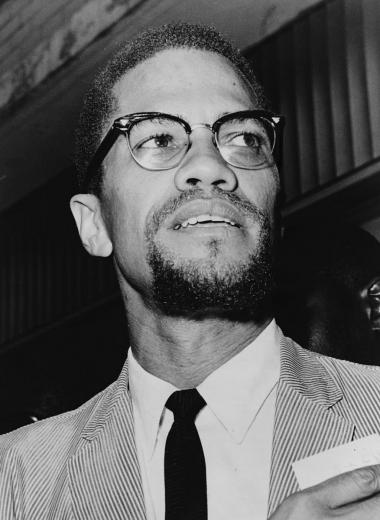
Malcolm Little is the birth name of el-Hajj Malik el-Shabazz (1925–1965), known as Malcolm X, a minister of the Islam faith, public speaker, and civil rights activist who said the most important issues for Black Americans were identity, integrity, and independence. He loved his people and lost his life in the struggle to free them from oppression. He said the ‘X’ in his name symbolized the true African family name that he could never know.
Born in Omaha, Nebraska, to Louise Norton Little, a homemaker, and Earl Little, a Baptist minister, Malcolm was one of eight children (some sources say seven). His father's avid support of Black nationalist leader Marcus Garvey and his civil rights activism resulted in death threats from a white supremacy group, Black Legion. Those threats forced the family to move two times (first to Milwaukee, Wisconsin, then to Lansing, Michigan) before Malcolm reached the age of four. In 1929, while living in Lansing, the family's home was burned to the ground. Two years later the body of Malcolm's father was found lying across the trolley tracks. The family was certain the fire and the murder were the work of the Black Legion (some sources say the Ku Klux Klan), but police ruled both incidents as accidents. Malcolm's mother later suffered an emotional breakdown and was committed to a mental facility. The children were separated from one another, living with family members and going into various foster homes and orphanages.
In 1946, while living with a half sister in Boston, Massachusetts, Malcolm and his friend "Shorty" Jarvis were arrested on burglary charges. They were convicted, and Malcolm was sentenced to ten years in prison. During his time in prison, he spent time furthering his education and also conversed frequently with his brother Reginald, who had converted to the Islam religion and belonged to the Nation of Islam (NOI), an African-American movement that combined elements of the Islam faith with elements of Black nationalism. By the time Malcolm was paroled from prison after serving seven years of his sentence, he had become a devoted follower of NOI leader Elijah Muhammad, who taught that White society intentionally kept African-Americans from empowering themselves, limiting their economic, political, and social success, and who promoted the establishment of a separate state just for African-Americans.
Impressed by Malcolm's intelligence and articulate speaking, Elijah Muhammad appointed him a minister and national spokesman for NOI. Malcolm founded the NOI newspaper Muhammed Speaks and established new mosques in several cities, including Detroit, Michigan, and Harlem, New York, while communicating NOI's message through newspaper columns, radio, and television. His charisma attracted many new members, and the NOI membership increased from 500 in 1952 to 30,000 in 1963. With racial tensions running high in the early 1960s, and with Malcolm's popularity increasing, the FBI infiltrated NOI, secretly monitoring the group's activities through various types of surveillance equipment.
In 1963, at the height of the civil rights movement in the United States, Malcolm learned that his mentor and leader, Elijah Muhammad, was sexually involved with as many as six women within NOI, resulting in the birth of several illegitimate children. Malcolm's faith was crushed, because he had adhered to the teaching of Muhammad, which included being celibate before his marriage to Betty (Sanders) Shabazz in 1958. When Elijah Muhammad asked Malcolm to help cover up the affairs, Malcolm refused. He felt deceived by the man whom he had considered a living prophet, and he felt guilty about leading so many people to NOI, which in his eyes had become a fraudulent organization built on lies. In early 1964, he left NOI, founded his own organization, the Muslim Mosque, Inc., and adopted the Muslim name el-Hajj Malik el-Shabazz.
Also in 1964, Malcolm traveled to Saudi Arabia to make the pilgrimage to Mecca. During that journey, while sharing his thoughts and beliefs with others, he discovered that people of different cultures mostly responded positively. When he returned to the United States, he said he had met and spoken with "blonde-haired, blue-eyed men I could call my brothers." This experience changed his outlook on integration and gave him hope for the future of the country. He began speaking to people of all races, not just African-Americans.
Malcolm's departure from NOI resulted in an increasingly volatile relationship between him and Elijah Muhammad. FBI agents who had infiltrated NOI warned federal officials that Malcolm had been targeted for assassination and that, in fact, one agent had been told to plant a bomb in Malcolm's car. As the number of threats on his life increased, he began to travel with bodyguards, but that did not deter his enemies from firebombing on February 14, 1965, the home in East Elmhurst, New York, where he and Betty lived with their four daughters. The family fortunately escaped physical injury.
A week later, though, his enemies succeeded in their efforts to eliminate Malcolm. On, February 21, 1965, while he was speaking in the Manhattan's Audubon Ballroom, three gunmen rushed onto the stage and shot him fifteen times at close range. He was pronounced dead on arrival at New York's Columbia Presbyterian Hospital. He was 39 years old.
On February 27, 1965, more than 1,500 people attended Malcolm's funeral at the Faith Temple Church of God in Christ. Later that same year, Betty gave birth to twin daughters.
In March 1966, three members of NOI—Talmadge Hayer, Norman 3X Butler, and Thomas 15X Johnson—were convicted of first-degree murder for the assassination of Malcolm.
Malcolm wrote his life story, The Autobiography of Malcolm X (1965) with Alex Haley, and his speeches are recorded in a collection, Malcolm X Speaks. In 1992, Spike Lee directed and released the film Malcolm X, which received Oscar nominations for best actor (Denzel Washington) and Best Costume Design.





